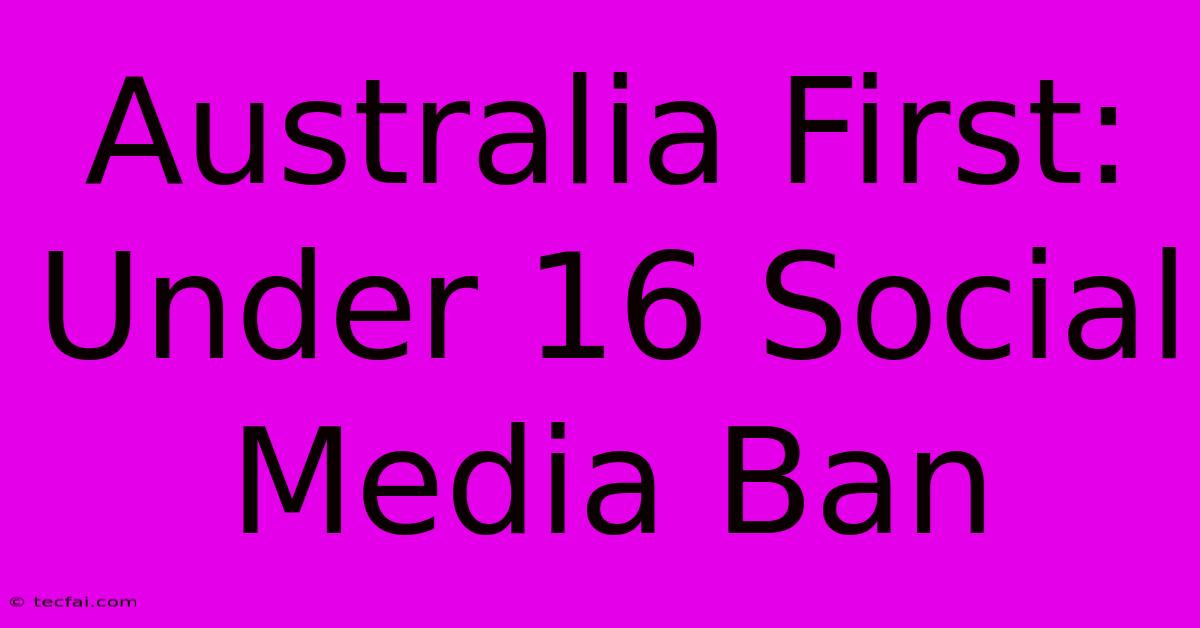Australia First: Under 16 Social Media Ban

Discover more detailed and exciting information on our website. Click the link below to start your adventure: Visit Best Website tecfai.com. Don't miss out!
Table of Contents
Australia First: Under 16 Social Media Ban – A Necessary Step or an Overreach?
Australia is grappling with a complex issue: the potential harms of social media on young people. A proposed ban on social media for children under 16 is sparking heated debate, pitting parental rights against the perceived need for government intervention. This article delves into the arguments for and against this controversial proposal, examining its potential impact on children, parents, and the digital landscape.
The Case for an Under-16 Social Media Ban in Australia
Proponents argue that a ban is a necessary measure to protect vulnerable young minds from the potential negative consequences of social media. These include:
Mental Health Concerns
- Cyberbullying: The anonymity and reach of online platforms can exacerbate bullying, leading to anxiety, depression, and even suicidal ideation in young people. A ban could significantly mitigate this risk.
- Body Image Issues: Constant exposure to curated and often unrealistic portrayals of beauty on social media can negatively impact self-esteem and contribute to eating disorders. Protecting children from this early exposure is a key argument for the ban.
- Addiction and Time Management: Social media is notoriously addictive, potentially impacting schoolwork, sleep, and overall wellbeing. A ban could help young people develop healthier habits and prioritize other activities.
- Privacy and Data Security: Children under 16 may not fully understand the implications of sharing personal information online, making them vulnerable to exploitation and data breaches. A ban provides a layer of protection.
Developmental Considerations
- Cognitive Development: Experts argue that the brains of children under 16 are still developing, and excessive social media use can interfere with healthy emotional and social development. The ban aims to allow children to develop these skills through real-life interactions.
- Identity Formation: The pressure to present a perfect online persona can hinder the natural process of self-discovery and identity formation during adolescence. A ban allows for a more organic and less pressured path to self-understanding.
Counterarguments and Challenges to an Australian Social Media Ban
Opponents raise several significant concerns about the feasibility and impact of a blanket ban:
Enforceability and Practical Implications
- Parental Responsibility: Critics argue that the primary responsibility for monitoring children's online activity lies with parents, not the government. A ban might shift the burden of responsibility without providing effective solutions.
- Technological Challenges: Completely blocking access to social media platforms for all under-16s would be incredibly difficult to enforce, given the technological sophistication of young people and the availability of VPNs and other circumvention tools.
- Freedom of Speech Concerns: A ban could be seen as an infringement on the rights of young people to express themselves and access information online. This raises important ethical and legal questions.
Potential for Negative Consequences
- Social Isolation: For some children, social media provides vital connections with friends and family, especially those living in remote areas. A ban could exacerbate feelings of isolation and loneliness.
- Educational Limitations: Social media can be a valuable tool for learning and accessing educational resources. A complete ban could limit children's access to these benefits.
- The Digital Divide: A ban might disproportionately affect children from low-income families who may rely on free social media platforms for communication and access to information.
Finding a Balance: Alternative Approaches
Instead of a complete ban, alternative approaches might be more effective and less controversial:
- Age Verification Systems: Strengthening age verification systems on social media platforms could be a more practical and less restrictive approach.
- Increased Parental Controls: Empowering parents with tools and resources to manage their children's online activity could be more effective than a government-imposed ban.
- Comprehensive Education Programs: Educating children and parents about the risks and responsible use of social media is crucial.
The debate surrounding an under-16 social media ban in Australia highlights the complex challenges of balancing the need to protect children with the rights and freedoms of individuals in the digital age. Finding a solution that addresses the concerns of all stakeholders will require a nuanced and thoughtful approach. The focus should be on developing strategies that promote responsible online behavior while acknowledging the important role social media can play in the lives of young people.

Thank you for visiting our website wich cover about Australia First: Under 16 Social Media Ban. We hope the information provided has been useful to you. Feel free to contact us if you have any questions or need further assistance. See you next time and dont miss to bookmark.
Featured Posts
-
Actress Discusses Her Past Life
Nov 29, 2024
-
Drew Lock Starting For Giants De Vito Injured
Nov 29, 2024
-
Royal Tribute William Kate Remember Liz
Nov 29, 2024
-
Recap Chicago Bears At Detroit Lions
Nov 29, 2024
-
How To Watch Raiders Vs Chiefs
Nov 29, 2024
